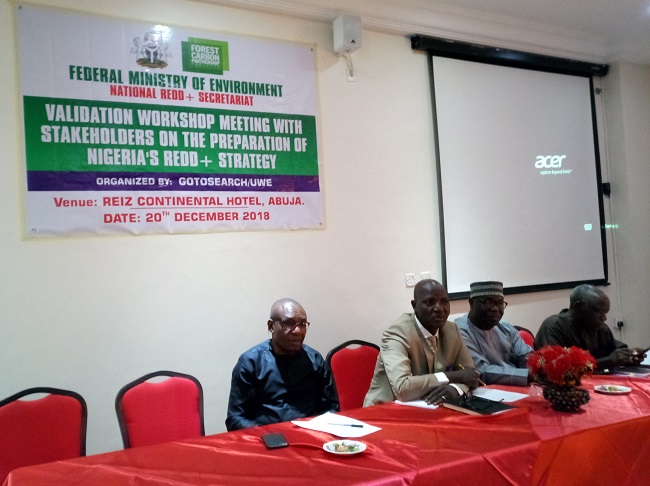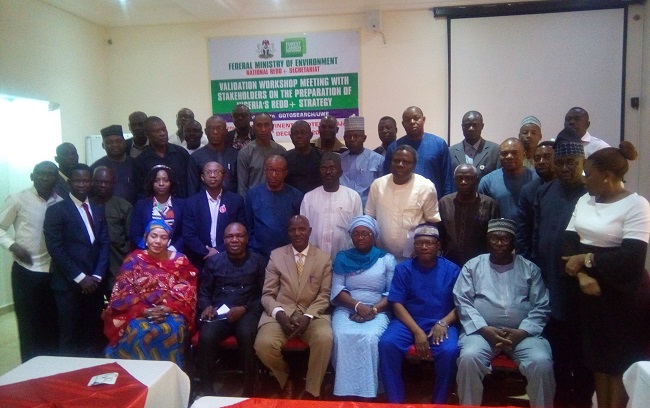Nigeria now has in place a plan to promote its REDD+ agenda, thanks to a World Bank and Forest Carbon Partnership Facility (FCPF) promoted initiative that was officially rounded up a couple of weeks ago.

REDD+ implies reducing emissions from deforestation and forest degradation and the role of conservation, sustainable management of forests and enhancement of forest carbon stocks in developing countries.
At a daylong event held in Abuja on Thursday, December 20, 2018, a cross section of stakeholders gathered to discuss and validate a draft report on Nigeria’s REDD+ Strategy prepared by Messrs. Gotosearch.com Ltd. and University of the West England (UWE), the consortium that was engaged to carry out the assignment.
The validation workshop was also held to enrich the technical contents of the report and give it a national outlook and acceptability.
“This is a document that Nigeria will be using to engage with the international community for the purposes of how to bring benefits that are linked to our efforts in emissions reduction, as well as our sustainable forest management approach. If this strategy is not very well crafted and we don’t capture the elements and the options that we intend to use in engaging, then we are taking a wrong step,” submitted Dr. Moses Ama, National Coordinator, Nigeria REDD+ Programme, during the official opening of the meeting.
Former Director of Forestry in the Federal Ministry of Environment, Philip Bankole, said: “We all know the problems in our forest reserves. So, whatever is written here are common issues familiar to us.
“It is a good development that the REDD+ Programme has gotten to this stage. It started some years ago and, despite a change of leadership, it is still going very strong because we have competent hands in place. Whatever comes out here today is to our own benefit. It is a national service. This is a policy document and thus it has a lot of bearing on what happens to our forest and government policies in the future.
Prof Olukayode Oladipo, Team Leader, Gotosearch.com, urged participants to feel free to criticise the document as, according to him, there is always a room for improvement on every document notwithstanding its quality.
Director of Forestry, David Andrew-Adejo, while declaring open the event, congratulated the REDD+ team “which includes the secretariat and the team that works with them on the field because all of you collectively have been contributing to the successes achieved by the REDD+ secretariat.”
He added: “Nigeria should start assessing the financing incentives that the REDD+ is trying to achieve as its end point. The benefit will only come if we have a good strategy developed by REDD. It takes care of how the villager that you asked not to cut his tree because of X-metric tonnes of carbon that it stores, and the villager does not eat X-metric tonnes. He just wants to cut it and use to cook or sell it. So, your strategy will be able to give that man an assurance that if he leaves that tree alone, he will be able to do something else that will enable him live the normal life he was living to the extent that he would be the one that will be your champion.”

The REDD+ Strategy report has sections like “Nigeria’s REDD+ Strategic Directions”, “Basis for Nigeria’s REDD+ Programme”, “Analysis of Strategic Options”, “Governance of REDD+ in Nigeria”, “Monitoring and Reporting of Nigeria’s REDD+ Implementation”, and “Action Plan for the Implementation of the Strategy”.
At the close of the day, the report was eventually approved for validation subject to the reflection of observered inputs and corrections by participants who delibrated in groups.
REDD+ is a voluntary initiative established under the United Nations Framework Convention of Climate Change (UNFCCC) with several operationally significant but non-legally binding decisions adopted by the Conference of the Parties. Other relevant initiatives include the UNREDD Programme, the Forest Carbon Partnership Facility (FCPF), and the Forest Investment Programme (FIP), each of which has its own requirements.
The United Nations Programme on Reducing Emissions from Deforestation and Forest Degradation (or UN-REDD Programme) is a collaborative programme of the Food and Agriculture Organisation of the United Nations (FAO), the United Nations Development Programme (UNDP) and the United Nations Environment Programme (UNEP), created in 2008 in response to the UNFCCC decisions on the Bali Action Plan and REDD at COP13 held in 2007.
The Forest Carbon Partnership Facility (FCPF) is a global partnership focused on reducing emissions from deforestation and forest degradation, forest carbon stock conservation, sustainable management of forests, and enhancement of forest carbon sotcks (REDD+).
FCPF is made up of two separate, but complementary, funds that support countries in their REDD+ preparations – the Readiness Fund and Carbon Fund. The Readiness fund assists participant countries prepare for REDD+ by developing policies and systems, in particular national REDD+ strategies; developing reference emission levels (RELs); designing measurement, reporting and verification (MRV) systems; and establishing national management arrangements, including safeguards, for REDD+.
The Forest Investment Programme (FIP) is a targeted programme of the Strategic Climate Fund (SCF), which is one of two funds within the framework of the Climate Investment Funds (CIF).
The FIP supports developing countries’ efforts to reduce deforestation and forest degradation (REDD) and promotes sustainable forest management that leads to emission reductions and the protection of carbon reservoirs.
